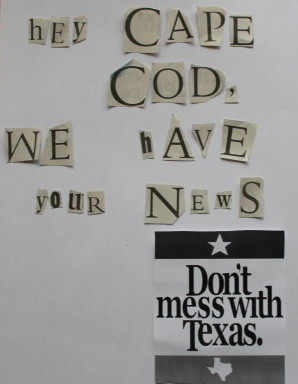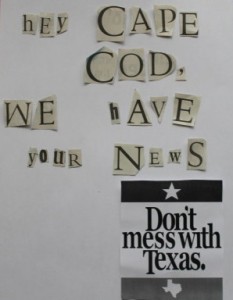CAPE COD, AMERICA – Hey y’all, the copy editing and design department of the Cape Cod Times will soon move to Texas. As Texas Governor Rick Perry once famously said, “Oops.”
“I understand the whole bottom line thing,” said former Times reporter Paula Peters who was among a group of people who, on March 29, started a Facebook page, “Keep Local News Local” protesting the Cape Cod Times newsroom job moves to a location 2,000 miles away. “But the news product has been so diminished on Cape Cod…. this is disloyal to their readership.”
According to a summary post by administrators launching the Facebook page, “31 people, including 26 newsroom employees (writers, editors, designers, photographers) have lost their jobs at the Cape Cod Times since the paper was purchased last fall by GateHouse Media.” Gatehouse Media is headquartered in Fairport, New York. The Facebook page had 300 “Likes” in its first six days.
The loss in staff, and coverage, had already concerned many. And then in March, Gatehouse announced it was moving 14 newsroom positions, the copy editing and design department, to Austin, Texas.
“It really hit me with the news that the copy desk is moving to Texas,” said former Cape Cod Times copy editor Diana Kenney, who also is in the group that started the Facebook page. “It just struck me as absurd.”
“I just can’t imagine the first time a copy editor in Texas comes across a story on quahogs,” said James Kershner, former Sunday Editor of the Times, who went on to be a Professor of Journalism at Cape Cod Community College. “They won’t even have the slightest idea what quahogs are. It’s outrageous that someone in Texas is going to edit the Cape Cod Times.”
































